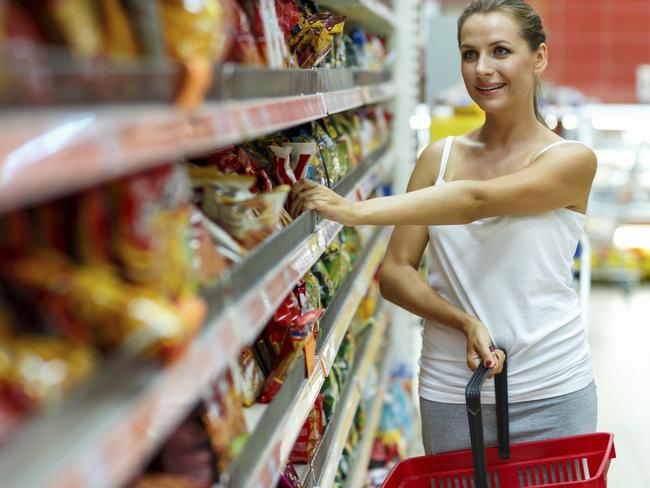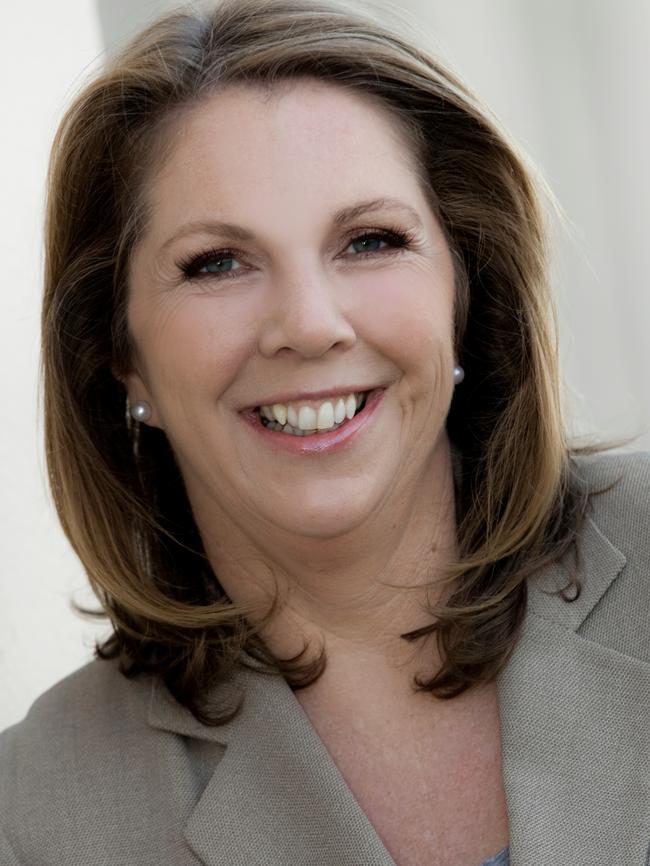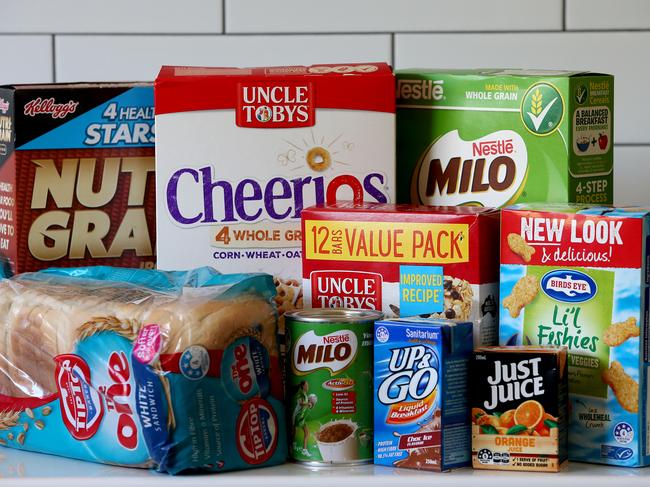Experts: Health food labels trick parents into buying sugary treats
Obesity experts are calling for a major overhaul of the Health Star Rating system amid claims it is luring parents into buying high-sugar contents thinking they are healthy. DO YOU KNOW HOW MUCH SUGAR IS IN YOUR FOOD?
NSW
Don't miss out on the headlines from NSW. Followed categories will be added to My News.
Parents are being lured into buying high sugar products thinking they are healthy by the Health Star Rating system.
Meanwhile nutritious foods such as milk, vegetables and fruit, which have naturally occurring sugars, are marked down by the same system.
Now obesity experts are calling for the system to be overhauled and include explicit detail on added sugar to help consumers make healthier choices.
A five-year review of the Health Star Rating system, which is nearing completion, recommends it only measures total sugars. Obesity experts argue naturally occurring sugars found in dairy products, fruit and vegetables are not the problem and added sugars will remain hidden under the current recommendations.

Dr Nick Fuller from the Charles Perkins Centre at the University of Sydney said the current recommendations discriminates against healthy foods that contain naturally occurring sugars.
“Naturally occurring sugars are not harmful, are found in nutritious foods like milk and fruit and vegetables and are good for you,” Dr Fuller said.
“These foods help keep the weight off.
“The Health Star Rating system should give positive points for naturally occurring sugar and negative points for added sugar and the rating system should be mandatory across all foods.”
The review also recommends the Health Star Rating system remain voluntary but only one in three supermarket products carry the stars.
SCHOOL IN ANTI-VAX HEARTLAND OFFERING STUDENTS MEASLES JABS
IMPROVEMENTS IN IVF LEAD TO RISE IN ‘TWIBLINGS’
A recent Australian survey showed two-thirds of consumers purchasing a product were influenced by the Health Star Rating and one-third were influenced to purchase a product with more stars.
Fresh fruit and vegetables do not carry a rating and should all be five stars by their nature, Dr Fuller said.
“The problem with it being voluntary is it’s not a clear comparison, you walk down an isle and see a packet of chips with a three star rating and you think it’s healthy,” Dr Fuller said.
“It misleads consumers, you either make it mandatory or get rid of it altogether.”
The Health Star System was implemented in 2014 in response to the growing obesity epidemic but has been plagued with problems.
For instance, Nestle was forced to remove its controversial 4.5 health star rating on Milo. The chocolate and malt powder is almost half sugar but claimed the higher star rating after being mixed with milk.
Shadow health spokeswoman Catherine King said Labor would address the shortcomings if elected.
“Health star ratings were an important Labor reform but sadly the Liberals have botched the implementation,” she said.
“We recognise this system is not working as well as it could and should. Labor will have more to say on this topic in the course of the election campaign.”
Ms King said the obesity epidemic needed government leadership.


Jane Martin from the Obesity Policy Centre said added sugars, even if derived from fruit concentrate, needed to be factored into the star system.
She said foods such as Heinz Little Kidz Shreds, which are 60 per cent sugar (from fruit concentrate) were packaged as healthy.
Heinz was fined $2 million last year for deceptive conduct.
“Products with fruit concentrate are being treated leniently and considered a positive, but the World Health Organisation says added sugars processed from fruit is the same as that processed from sugar cane,” Ms Martin said.
And while Kellogg’s carries star ratings on its cereals, it leaves them off children’s snack foods such as LCMs, which qualify for only half a star according to the Kellogg’s website.
“Things like fruit straps and products targeted at kids for school lunch boxes contain as much added sugar as confectionary,” she said.
“Added sugars need to be a category and they should be added to the health star algorithm,” Ms Martin said.
“We looked at cereals considered high in sugar — more than 15 grams of sugar per 100 grams — and the impact of the changes proposed on the health star ratings on those products,” Ms Martin said.

“We found that there would be minimal changes to the ratings and some would keep their current rating, which we believe is too high.”
A ratio of 15 grams of sugar per 100 grams equates to four teaspoons of sugar.
Of the 12 breakfast cereals examined, Milo would go from 4 stars to 3.5, Nutri-Grain would go from 4 stars to 2.5 and Coco Pops would go from 2 stars to 1.5.
“You need to be able to choose healthier products for kids but it’s a minefield,” Ms Martin said.
Alexandra Jones, a researcher from the George Institute of Global Health, said the USA had now included added to sugar on nutrient panels.
“Such information does allow people to see added sugar and its not just in junk food, it is in half of all core foods recommended for a healthy diet. Consumers want the information and they should have it,” Ms Jones said.
“Having to declare it is also an incentive to take it out.”


